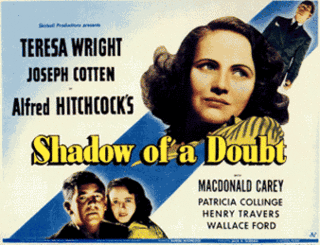 Recently saw Alfred Hitchcock's Shadow of a Doubt (1943) for the first time, one of his most entertaining films. The dialogue is excellent, especially that of the precocious children, unique and often hilarious characters. The film revolves around a young woman named Charlie and the uncle she's named after, a man who we quickly learn is a killer. (Although the film begins with him in early scenes, it quickly becomes her film, dominated by her point of view, not that of the killer, as Truffaut erroneously implies in his classic interviews with Hitchcock.
Recently saw Alfred Hitchcock's Shadow of a Doubt (1943) for the first time, one of his most entertaining films. The dialogue is excellent, especially that of the precocious children, unique and often hilarious characters. The film revolves around a young woman named Charlie and the uncle she's named after, a man who we quickly learn is a killer. (Although the film begins with him in early scenes, it quickly becomes her film, dominated by her point of view, not that of the killer, as Truffaut erroneously implies in his classic interviews with Hitchcock. I find that Truffaut is too often wrong about the details of Hitchcock's films in that book, and Hitchcock usually doesn't correct him, but it must have been easy to become confused is discussing so many films they probably hadn't seen in a while.)
I think what's most fascinating about the film is the way this young heroine decides to deal with her suspicions on her own, without turning to the law (despite ample opportunity) or even her parents. She wants to protect them, and so they become as innocent as the young children. I often find that films made during WWII deal in some way with the great absence of men in their prime years. (You can also feel it in Meet Me in St. Louis, made the year after, partly in the expression of longing for a young man.) Charlie is greatly endangered, yet still prefers to come to an understanding with the killer rather than turn him in and shame the family who, living in an idyllic small California town, are more vulnerable to the effects of reputation.
I love Hitchcock's subversive sense of humor throughout the film, which never comes close to the pitch of The Trouble with Harry but still seems a risky strategy in a story involving the murder of innocents. Charlie's father, played by Henry Travers (Clarence in It's a Wonderful Life) has a running game going with a friend (played by Hume Cronyn) in which, inspired by radio serials, they try to plot the perfect murder. It's a charmingly anti-pretentious touch, drawing attention as it does to the film's own lurid story, though perhaps it's a bit of showing off, because Hitchcock knows he can keep us absorbed despite this threat to the narrative illusion. There are, though, a couple moments that play in a very strained way now, in which the killer mutters his psychotic thoughts but we're asked to believe that only young Charlie understands their significance while the others don't catch on.
Just for the record, the movie also features yet another classic librarian stereotype who comes on stern but then assists the young detective. The film also uses an old waltz in a fascinating way, hypnotic and nostalgic, yet woven into the plot as a subliminal clue. (And here are some more images from the film.)
Rating: 3 1/2 out of 4 stars.
Decent little article on the trend (which I recently blogged about) of books about the film canon. It mentions the Derek Malcolm book, which I have and isn't bad, as well as Ebert's, Rosenbaum's and Turan's recent books, but it omits Flickers by Gilbert Adair, one of the quirkiest and most interesting book of this type.
Song: "Merry Widow Waltz," used in Shadow of A Doubt
Labels: Hitchcock, Movie Reviews


0 Comments:
Post a Comment
<< Home